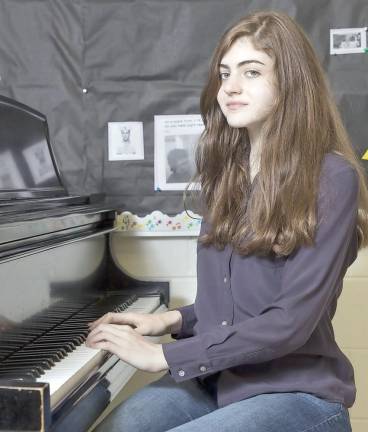‘It takes a lot of practice but it’s great when you get it’
Warwick. Superintendent’s Artist of the Week: Emily Gelman.

For a young musician, Warwick Valley High School junior Emily Gelman has a profound interest in an instrument that to some seems a bit old-fashioned: She started playing the organ at the end of 2019 after playing the piano for years.
“The piano teacher had an organ in her house and I thought that was really cool,” Emily said. “So I decided I would use my piano skills as a stepping stone to begin learning the organ.”
Emily began by taking organ lessons from Janet Nelson-Nickerson in New Windsor. Then last June she applied to a pre-college organ program at The Juilliard School. She recorded a few pieces, was accepted and recently completed the program. Emily said she learned many skills and other things that really helped her.
Now that the Juilliard program is over, Emily will be back taking lessons from Nelson-Nickerson, who described Emily as an “absolutely excellent student who is doing very well.”
Emily in turn described Nelson-Nickerson as a great mentor.
“She has been instrumental in not only teaching me the fundamental basics about the musical organ,” Emily said, “but also in cultivating an appreciation for this magnificent instrument.”
‘Back in the 60s and 70s’
Although Emily started playing the piano when she was 4 or 5 years old, transitioning from the piano to the organ was not easy. And these days, teenagers playing the organ at all is a bit unusual.
“Back in the 60s and 70s, everyone was buying those little spinet organs for their homes,” Mrs. Nickerson said. “That was the in thing to do, so lots and lots of kids were playing the organ back in those days. But through the years they’ve gone by the board, and now kids aren’t even playing the piano much anymore.”
Playing the organ is more complicated than the piano because in addition to using your hands on the keys, you are using your feet on the pedals. In addition, some organs have two or more keyboards.
“The magnitude of the whole thing, especially if it’s a pipe organ, is different,” Emily said. “The sound is larger. It’s a really grand instrument, I feel. When you’re playing it, it’s a lot to do at once, so it can be kind of chaotic in that sense. But I really like taking all of those elements and finding a way to blend them together harmoniously. You really feel like it’s just coming naturally – which it doesn’t; it takes a lot of practice but it’s great when you get it.”
Emily recently acquired an electronic organ and can now practice at home. Emily tries to practice at least two hours a day and plans to continue with the organ in the long term.
Away from the keyboard
Emily also excels in fencing. She trains at the Phoenix Center in Poughkeepsie and recently finished first in a competition to qualify for the nationals. Emily will be competing in the Junior Women’s Epee at the Junior Olympics in Philadelphia next month.
At WVHS, Emily has played the piano as an accompanist at chorus concerts. She founded the International Club last year and is also a member of the National Honor Society and Mu Alpha Theta math honor society.
At the WVHS Awards Ceremony, Emily won a University of Rochester George Eastman Young Leaders award, which is given to students who demonstrate strong leadership experience at school and in the community, earn high grades in challenging courses and are extensively involved in extracurricular activities. She also recently earned a Seal of Biliteracy in Spanish.
Emily is also on the student board at the Albert Wisner Public Library and is a member of the Warwick Historical Society and the American Guild of Organists. Last summer, she was selected to participate in the AGO summer enrichment program called Pipe Organ Encounters, which gave young organists the opportunity to play the pipe organ at Yale and other universities in the Northeast. Unfortunately, it was cancelled due to COVID.
Practice, practice and then some more practice
Emily recently acquired an electronic organ and can now practice at home. Emily tries to practice at least two hours a day and plans to continue with the organ in the long term.
Playing the organ is more complicated than the piano because in addition to using your hands on the keys, you are using your feet on the pedals. In addition, some organs have two or more keyboards.
“The magnitude of the whole thing, especially if it’s a pipe organ, is different,” Emily said. “The sound is larger. It’s a really grand instrument, I feel.
“When you’re playing it, it’s a lot to do at once, so it can be kind of chaotic in that sense,” she added. “But I really like taking all of those elements and finding a way to blend them together harmoniously. You really feel like it’s just coming naturally – which it doesn’t.
“It takes a lot of practice but it’s great when you get it.”